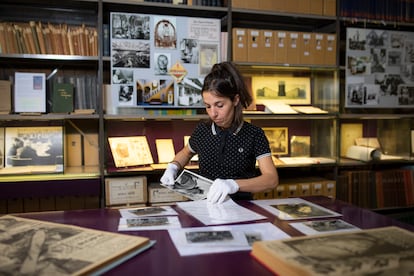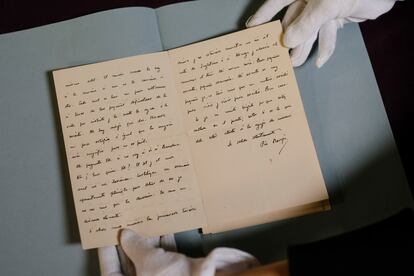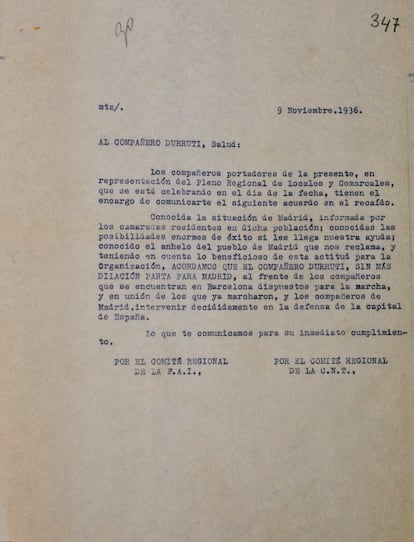Why Amsterdam is home to a trove of archives on Spanish anarchism and the anti-Franco resistance
The International Institute of Social History is home to historical documents from the CNT labor union and Iberian Anarchist Federation, including the order that sent Buenaventura Durruti to Madrid


A significant part of historical memory regarding Spain’s anarchist movement and the Spanish Civil War (1936-1939) can be found at the International Institute of Social History (IISH) in Amsterdam in the Netherlands.
Founded in 1935, the IISH is home to the historical archive of the National Confederation of Labor (CNT), an anarchist labor union, and the Iberian Anarchist Federation (FAI) – documents known in Spain as the so-called “Amsterdam boxes” – along with an extensive collection on workers’ activism and social movements across the world.
Sneaked out of the country to preclude confiscation by the regime of dictator Francisco Franco, these 47 boxes take up a stretch of the institute’s 20 kilometers of shelves and include the CNT-FAI’s order to the León-born anarchist leader Buenaventura Durruti to travel to Madrid in 1936, where he would meet his end in uncertain circumstances. The IISH also houses the archives from the anti-Franco resistance and the Ruedo Ibérico publishing house founded in Paris in 1961 by five exiles from the Spanish Civil War with the aim of producing anti-fascist material to counter the dictatorship’s propaganda. Adding to the cache are archives relating to the libertarian trade unionists and feminists, original letters from writer Pío Baroja, a member of the Generation of ’98, and thousands of photos of the Civil War that were thought to have been lost, including images captured by Polish photographer, Margaret Michaelis and Hungarian photographer, Kati Horna. Altogether, it amounts to the legacy of a polarized period of history that is a mine of information for researchers.
The unsealed document containing the order to Durruti, signed by the regional committees of the CNT-FAI, was dated November 9, 1936, and stipulated that “comrade Durruti, without further delay, leave for Madrid [...] to intervene decisively in the defense of the capital of Spain.” According to Almudena Rubio, responsible for recovering the document, it is proof that “the leadership of the National Confederation of Labor and the Iberian Anarchist Federation was behind that decision, while Durruti himself wanted to take Zaragoza.”

Rubio adds that it was not uncommon for orders from the CNT-FAI to be unsealed, and that, though there was a rift between the union and its rank and file, “it seems that Durruti was considered essential to the anti-fascist struggle in the capital.” By ordering a change of plans for the anarchist, “the communists, who were already taking positions in Madrid, benefitted as did [Russian leader Joseph] Stalin, who was against the social revolution pursued by Durruti,” she says.
Those signing the document mention “the enormous possibilities of success [of our comrades] if our help reaches them,” and “the pleas of the people of Madrid, who are calling on us.” The reality, however, was quite different. Durruti was shot dead days after arriving with no conclusive explanation for his death. His driver, Clemente Cuyás, said in 1993 that he had been the victim of an accidental shot from his own rifle and that the CNT-FAI demanded any witnesses remain silent. Other versions speak of his death in combat or from a traitor’s bullet.
The arrival in the Netherlands of the CNT-FAI archive was not without its share of drama. “When it became clear in 1939 that the Republican side would not win the Civil War, union representatives took it to the Paris branch of the IISH,” says Leo Lucassen, IISH research director. “They did it as private individuals, to avoid the new fascist state being able to claim it later as belonging to a Spanish organization.”

Shortly before the outbreak of World War II, the archive was transferred from Paris to the United Kingdom and was taken to Amsterdam in 1947. Closed for three decades, until Franco’s death, an inventory wasn’t taken until the 1980s. Lucassen stresses that the Spanish Civil War generated ideas on an international scale that had an indisputable impact. “Proof of this is that among the International Brigades there were hundreds of Dutch people committed to what was presented as the ultimate struggle: the fight between good and evil,” he says, adding that it was, however, difficult for them to return to the Netherlands. “Their passports were taken from them as they had fought with a foreign army. They were seen as traitors to their homeland, but also as liberating icons.” The nationality of Dutch members of the International Brigades was reinstated in 1970, and Amsterdam dedicated a monument to them in 1986 in a square called Spanje (Spain) 1936-1939.
Baroja’s letters
Among the Spanish correspondence preserved in the Archive of the Spanish Resistance, which collected documents up to 1974, are three original letters by the writer Pío Baroja. They are addressed to Concepción Martí Vall or Ada Martí, an anarchist writer and journalist who was an admirer of Baroja though she later distanced herself from him, feeling he had betrayed the social nature of his early works. Dated 1936, when Martí was 21 and Baroja 64, the letters’ tone suggests an exchange between an idealized professor and his pupil. For example, Baroja confesses his passion to “live to write, write to live;” while also telling Martí things such as, “I no longer need a compass because I am anchored in the harbor. You are the one who should be attentive to the marking needle.” The cultural center Ateneu Enciclopèdic de Barcelona has a photocopy of these missives and was unaware of the presence of the originals in Amsterdam until now.
Meanwhile, the archive of the Ruedo Ibérico publishing house contains the manuscript of Viaje al Sur (or, The Trip South) – a book the publishers commissioned Juan Marsé to write but which was assumed to have gone missing until it was realized that it has been renamed Andalucía, perdido amor (or, Andalusia, lost love) with Marsé writing under the pseudonym Manolo Reyes; it was published after the writer’s death, in 2020, by Lumen publishing house.
An archive of archives
Founded in 1935 by Dutch professor of social and economic history, Nicolaas Posthumus (1880-1960), the IISH has become an archive of archives. Its treasures include papers by Karl Marx, Freidrich Engels, Mikhail Bakunin and the anarchist Emma Goldman, which are among one million books and publications, 5,400 collections and 1.5 million audiovisuals. “Posthumus was interested in the intellectual roots of ideas from anarchists, socialists, liberals and Christian democrats,” says Lucassen. “Around 1930, when left-wing movements were threatened by fascism and National Socialism in Europe, he began to receive documents from social organizations, often taken under the radar from their countries of origin which enabled him to maintain the independence of the new center. Entire collections of left-wing publications from Latin American countries such as Argentina and Bolivia have been entrusted to us. It is a heritage that continues to be sent to the center from areas where similar conflicts persist.”
Rubio hopes to present an exhibition in 2022 with the Civil War images taken by Kati Horna, and her colleague, Margaret Michaelis, recovered from 2015. They were commissioned by the CNT-FAI to provide a graphic testimony of the social revolution it intended; the photos were in the photographic archive of the CNT-FAI’s foreign propaganda offices, included in the Amsterdam boxes.
English version by Heather Galloway.
Tu suscripción se está usando en otro dispositivo
¿Quieres añadir otro usuario a tu suscripción?
Si continúas leyendo en este dispositivo, no se podrá leer en el otro.
FlechaTu suscripción se está usando en otro dispositivo y solo puedes acceder a EL PAÍS desde un dispositivo a la vez.
Si quieres compartir tu cuenta, cambia tu suscripción a la modalidad Premium, así podrás añadir otro usuario. Cada uno accederá con su propia cuenta de email, lo que os permitirá personalizar vuestra experiencia en EL PAÍS.
¿Tienes una suscripción de empresa? Accede aquí para contratar más cuentas.
En el caso de no saber quién está usando tu cuenta, te recomendamos cambiar tu contraseña aquí.
Si decides continuar compartiendo tu cuenta, este mensaje se mostrará en tu dispositivo y en el de la otra persona que está usando tu cuenta de forma indefinida, afectando a tu experiencia de lectura. Puedes consultar aquí los términos y condiciones de la suscripción digital.








































